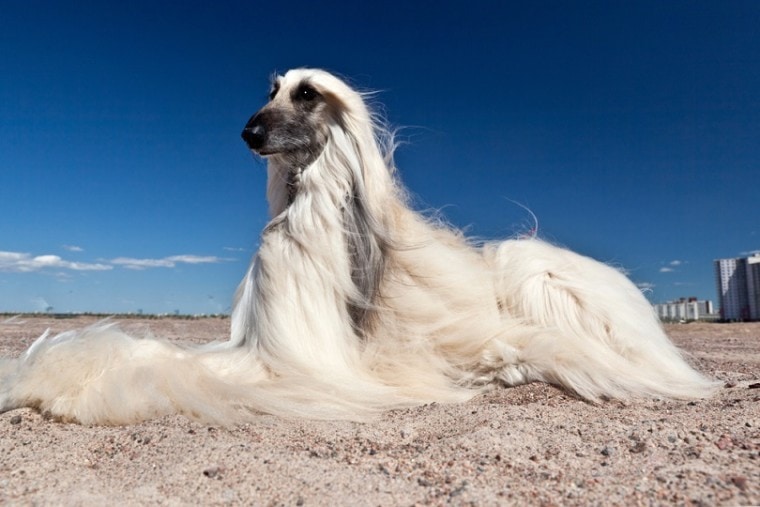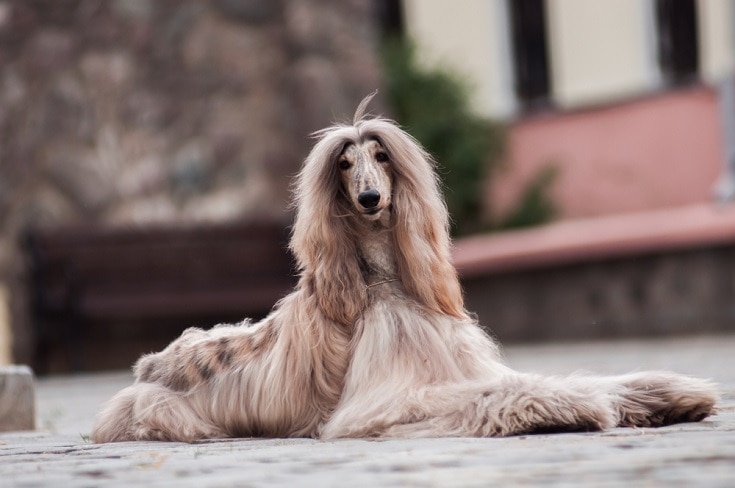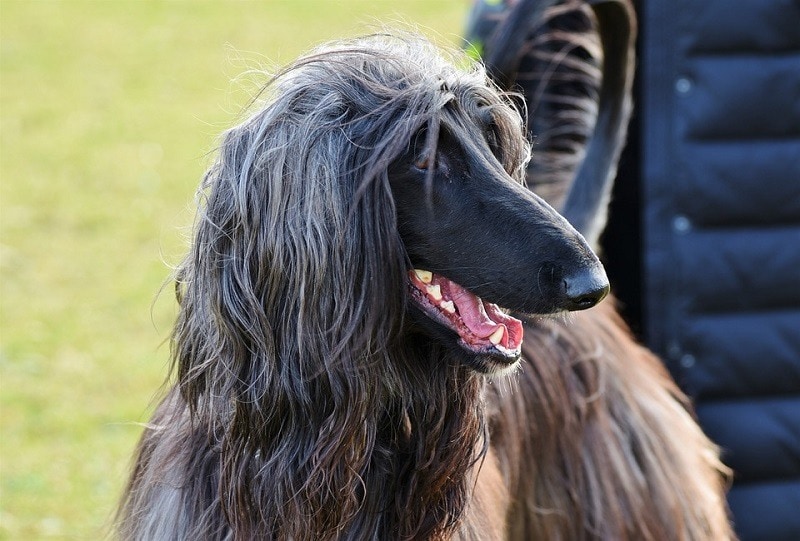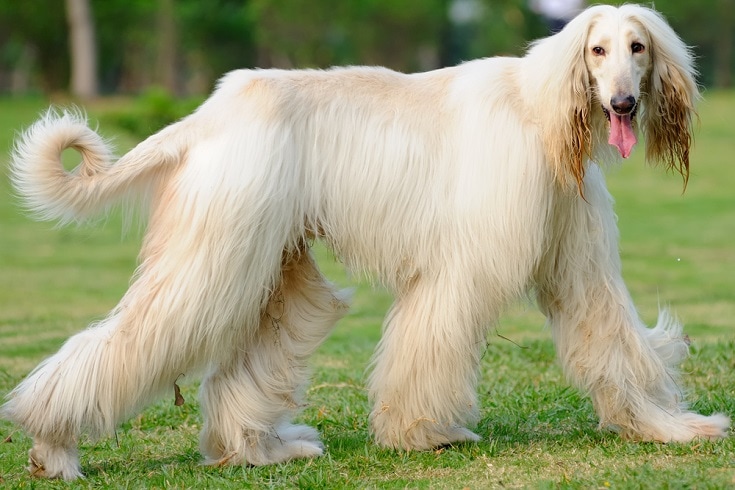
Click Below to Skip Ahead
As one of the world’s oldest dog breeds, the Afghan Hound is a regal and high-maintenance dog that evolved in the varied terrain of Afghanistan, hence the name. These dogs are independent and intelligent. They have a very diverse personality, sometimes being rather standoffish and other times engaging in playful and goofy behavior.
Breed Overview
Height:
24 – 29 inches
Weight:
40 – 60 pounds
Lifespan:
12 – 15 years
Colors:
Black, red, cream, blue, silver, white
Suitable for:
Families with children, those looking for a show dog, active families
Temperament:
Intelligent, active, high-maintenance, prey-driven (will chase cats), quiet
These dogs can be extremely awesome pets for the right family. They require extensive time devoted to them as they need to be trained with a soft hand due to their high intelligence. Their coat also requires a considerable amount of time to keep under control. Their origins as a hunting dog make them very active and self-driven. Don’t be surprised when they figure out how to open your doors and get into your fridge.
Afghan Hound Characteristics
Afghan Hound Puppies

Before bringing an Afghan Hound puppy into your home, it is important to research the breed and make sure that it is the right fit for you and your family. Afghan Hounds are a unique and elegant breed that have specific care requirements and personality traits.
When taking in an Afghan Hound puppy, you need to provide them with a healthy and balanced diet, as well as plenty of exercise and mental stimulation. Also, Afghan Hounds are prone to certain health issues, so it is important to provide them with regular veterinary care and to stay up-to-date on their vaccinations and parasite preventatives.
Temperament & Intelligence of the Afghan Hound
The Afghan Hound is a highly intelligent dog due to its breeding to be a hunting dog. They were bred to be able to independently hunt and solve problems without human intervention. This has led to the modern Afghan Hound being a very stubborn and independent creature.
Despite this tendency towards independence, they are extremely loyal dogs and have a friendly and loving nature. They love to play and can spend hours of time interacting with their people.
The Afghan is also a very quiet dog, and tends not to be much of a barker.
Are These Dogs Good for Families? 👪
Yes! Afghan Hounds can be great for an active family looking to spend more time outdoors and interacting with each other. Afghan hounds love to go on long walks with their people and can spend hours running around a fenced yard. Their loyal nature also tends to make them great family pets.
It is recommended to socialize your Afghan Hound puppy with children of all ages to ensure that your Afghan Hound is not wary of them. If you adopt an older Afghan Hound, it is best to have older children.
Does This Breed Get Along with Other Pets?

As long as Afghan Hounds are socialized at an early age, they tend to get along with other pets of the same size.
Due to their nature as a hunting dog, they have a high prey drive. This means they are likely to chase small animals, such as cats or other small dogs, that would run away from them. Their hunting background can make them dangerous to these small pets.
Things to Know When Owning an Afghan Hound:
Food & Diet Requirements 🦴

Afghan Hounds thrive on a diet full of high-quality and high-protein food. They should receive around 2 to 2½ cups of dry food per day. It is best to divide this portion into two meals: one in the morning and one in the afternoon. Wet food can replace all or some of the dry food if desired. Wet food can be great for picky eaters. It is also high in moisture, which can help avoid urinary tract infections and help keep your dog hydrated.
Exercise 🐕
Afghan Hounds require a very high amount of exercise. They should exercise at least 30 minutes a day, if not more. They enjoy long walks and also running fast. A great way to exercise your Afghan is to let them freely run in an enclosed or fenced area.
Training 🎾

Afghan Hounds can have a stubborn nature. Don’t worry though! Afghan Hounds can certainly be trained. The best way to train an Afghan is with a gentle hand. They do not respond well to punishments and can become unresponsive when more aggressive training methods are used.
Patience is definitely required to train your Afghan Hound. It can be a fun challenge, though, to work with your dog and help them master certain commands. Positive reinforcement is the most helpful method of training them.
Be sure to make training a habit. If you want to successfully train your Afghan, you should make training a daily habit. The more you work with them, the more they will learn.
Grooming ✂️
The long and luxurious mane of the Afghan Hound requires regular bathing and brushing to keep it in tip-top shape. You should bathe your Afghan at least once weekly. Be sure to use both a shampoo and a conditioner to keep the coat clean and soft. Once you have cleaned and conditioned the coat, brush it out with an oval pin brush. You should never brush a dry, dirty coat on an Afghan Hound.
To encourage good behavior during the grooming process, try to keep it as short as possible and reward your Afghan with treats during and after.
Health and Conditions 🏥
The Afghan is an overall healthy dog. But there are some health conditions to look out for and consider. To help catch these diseases early, be sure to take your Afghan to the vet each year for a yearly check-up.
Risk during anesthesia: Due to an Afghan’s lean body, they are more susceptible to problems occurring during anesthesia. An experienced vet will know how to combat these issues and should be able to make any anesthesia necessary as safe as possible.
Parasite infection: Fleas, ticks, and worms can infect your Afghan and cause several serious issues. This can be easily combatted by making sure your Afghan is on preventative medication as prescribed by a vet.
Dental disease: Afghan hounds are more likely than other dogs to develop dental disease. If not treated, it can lead to the loss of a dog’s teeth.
Heart disease: There are multiple types of heart disease that Afghans can develop. Your vet can listen for heart murmurs or irregular heart rhythms to help diagnose these types of diseases early on.
Bone and joint problems: Like many other purebred dogs, Afghans are genetically predisposed to have bone and joint problems. Hip dysplasia is a common bone and joint disease that causes to the hip joints to form improperly and leads to arthritis. This can be treated to avoid pain once it is diagnosed. If you notice your Afghan having trouble moving or getting around take them to the vet as soon as possible.
 Male vs Female
Male vs Female
Male Afghans tend to be a bit larger than their female counterparts. Males are usually 25-27 inches tall, while females tend to be around 25 inches. Males also usually weigh around 10 pounds more than females.
As far as temperament goes, males and females can be hard to tell apart. They are both aloof and independent, though the males may show their independent nature more often than the females.
3 Little-Known Facts about the Afghan Hound
1. Afghan Hounds are as fast as racehorses!
They can reach speeds of up to 40 mph. Their high speed and one-track mind when running make it incredibly important to always have your Afghan Hound on a leash when not in a fenced area to protect them from being hit by a car or other hazards.
2. Picasso owned an Afghan Hound!
Picasso owned many dogs, but one of his favorites was his Afghan Hound, Kaboul. Picasso named him after the Afghan capital. Kaboul appeared in several portraits with Picasso’s wife.
3. An Afghan Hound was the first dog ever cloned!
Snuppy, named for “Seoul National University Puppy”, was born on April 24, 2005. Snuppy was the lone survivor out of over 1,000 embryos! A miracle dog to say the least.
Final Thoughts
An Afghan Hound can be a quirky and entertaining dog if socialized properly from a young age. They do well with families and other similar-sized dogs. While they are difficult to train, it can be a fun challenge to work with them. If you are someone who values independence and intelligence in your animals and loves a challenge, the Afghan Hound might be right for you and your family.
- You may also be interested in: Afaird (Afghan Hound & Briard Mix)
Featured Image Credit: Anna Tronova, Shutterstock







